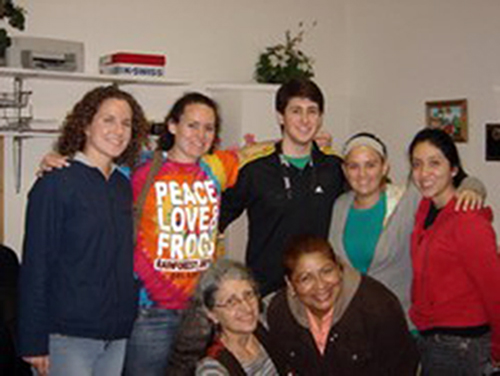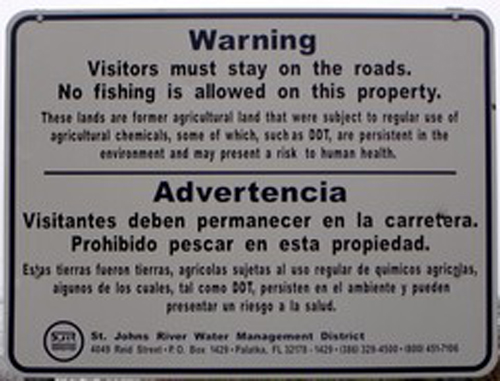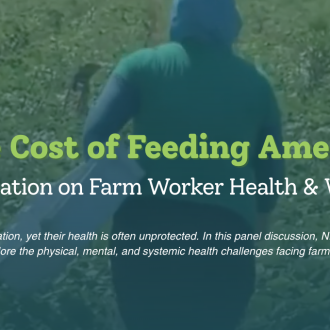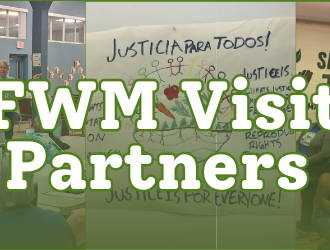 On January 18, 2008 Rollins College students, Deltona’s United Church of Christ members and Stetson University students got together in the Apopka office of the Farm Worker Association of Florida (FWAF) to learn and discuss the effects of pesticides in the Lake Apopka area.
On January 18, 2008 Rollins College students, Deltona’s United Church of Christ members and Stetson University students got together in the Apopka office of the Farm Worker Association of Florida (FWAF) to learn and discuss the effects of pesticides in the Lake Apopka area.
This event was called the Lake Apopka Toxic Tour and was hosted by Jeannie Economos from FWAF. The Toxic Tour began with a brief introduction about the environmental and human history of the lake. This area used to thrive with diverse fauna and flora and today it is a symbol of man-made environmental tragedies.
The destruction of the lake and the deterioration of farm workers’ health were caused by the release of dangerous chemicals into the environment. Lake Apopka is the most polluted large lake in the state of Florida. Also, the bird deaths in 1998-1999 were one of the worst bird mortality incidents in U.S. history. Although phosphorous run-off to the lake leads to the state’s efforts for environmental restoration, the unseen problem is the legacy that pesticides have left on the lake and its wildlife.
The first stop of the tour was at some housing camps, where farm workers are living. This stop gave us a brief insight at some of the conditions that the farm workers have to face day by day. These weren’t “homes” in another country these are “homes” in the state of Florida.
Then, we went to the Lake Apopka Restoration Area. The area is to remain untouched for ten years due to the severity of the contamination and the danger it poses to human health. After this time frame, the government will start working on restoration.
Jeannie pointed out the place where farm workers used to live. It was part of the land programmed for future restoration. While the government spends millions of dollars to study the impacts on wildlife, not one penny has been spent to look at the health effects of these very same pesticides on the health of the farmworkers.
We then, stopped at another site where all kinds of vegetables were grown. Due to the extreme pollution by chemicals in this area, it has been shut down. In its most productive years we could have seen dozens of farm workers working the fields. It is now considered a danger zone.
 Estela, a former Lake Apopka farm worker, explained to the group how she and other women worked in the packaging areas, like the one right behind her. She explained how after the vegetables were sprayed with pesticides in the fields; the vegetables were sprayed once again in the packaging areas with a chemical to keep them looking “fresh”. Her first hand account of the situation was extremely valuable for our understanding and education of what occurred in Lake Apopka.
Estela, a former Lake Apopka farm worker, explained to the group how she and other women worked in the packaging areas, like the one right behind her. She explained how after the vegetables were sprayed with pesticides in the fields; the vegetables were sprayed once again in the packaging areas with a chemical to keep them looking “fresh”. Her first hand account of the situation was extremely valuable for our understanding and education of what occurred in Lake Apopka.
We were then finally ready to see Lake Apopka. One of the first things we saw were the many signs that explained many of the problems surrounding Lake Apopka but they never fully admit to the disastrous results of the pesticides that were sprayed. Due to the way that Lake Apopka was used to irrigate the surrounding farm lands full of toxic pesticides have effected the environment.
Lake Apopka alligators were discovered to have reproductive and hormonal problems. In 1998, more than 800 birds turned up dead on Lake Apopka. Lake Apopka once visited for a specific type of fish, this species of fish is no longer present in the lake. Many other fish, like the one shown, and other species prominent to the lake environment have died or disappeared.
Farm workers like Estela, have never received significant assistance from the government or the growers. Being able to participate in this tour has educated us to the situation that is happening, and happened in Lake Apopka.
The severe consequences that the pesticides have caused in the environment, birds, alligators and other species are evident. The health of farm workers and their families have suffered greatly. Lake Apopka is an example of an extreme man-made tragedy that is affecting us all today.
By: Griselda Avila


















